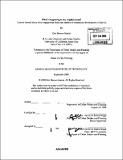| dc.contributor.advisor | Xavier de Souza Briggs. | en_US |
| dc.contributor.author | Brewer-Garcia, Eric | en_US |
| dc.date.accessioned | 2009-04-29T17:31:58Z | |
| dc.date.available | 2009-04-29T17:31:58Z | |
| dc.date.copyright | 2008 | en_US |
| dc.date.issued | 2008 | en_US |
| dc.identifier.uri | http://hdl.handle.net/1721.1/45370 | |
| dc.description | Thesis (M.C.P.)--Massachusetts Institute of Technology, Dept. of Urban Studies and Planning, 2008. | en_US |
| dc.description | Includes bibliographical references (p. 97-103). | en_US |
| dc.description.abstract | What does it take to create an active and engaged population that can be successfully integrated into decision-making that affect its communities? Planners and public officials must answer this question when developing public policies or planning community development interventions. This thesis analyzes two cases in which community development activities were each undertaken under a specific set of social, cultural, political and economic conditions that shaped the context of civic engagement. The case studies are set in Lawrence, (a medium-sized city in Northern Massachusetts that is home to many immigrants) and Mexico City's Centro Historico (a neighborhood in the heart of one of the largest cities in the world). I use a mixed-method approach that includes in-depth interviews with key informants, direct observation on the ground in each community, review of media and other documentary sources and a review of distinct approaches to analyzing public participation and civic engagement in different contexts. This thesis discusses rapid changes that each community has undergone at a local level in the last 20-30 years, as well as the effects of regional, national and global trends. Next, the thesis describes public participation strategies implemented as part of key interventions in each community. In Lawrence, the analysis is focused on particularly inclusive and empowering public participation strategies employed by non-profit organizations. In Mexico City, community development activities have been primarily implemented by the municipal government and the private sector and the public participation strategies were more limited and dis-empowering. I show how such strategies interacted with the broader context of civic engagement, using a three- part framework: the organizational level, project level and individual level. | en_US |
| dc.description.abstract | (Cont.) My analysis suggests that in addition to efficiency and effectiveness, organizational and project objectives should also be measured by the degree to which they ensure long-term sustainability by promoting broader civic engagement. This might mean the increased capacity of grassroots organizations to integrate themselves into the community development process, a breaking-down of the vertical power relations that existed in within a community and a leadership development strategy that is successful at developing a consciousness of civic engagement among community members. Beyond corroborating planning's well-established notion that public participation may contribute to the short-term success of a project in a community, I show how it may also shape public participation efforts in the future by improving the broader context of civic engagement. | en_US |
| dc.description.statementofresponsibility | by Eric Brewer-Garcia. | en_US |
| dc.format.extent | 103 p. | en_US |
| dc.language.iso | eng | en_US |
| dc.publisher | Massachusetts Institute of Technology | en_US |
| dc.rights | M.I.T. theses are protected by
copyright. They may be viewed from this source for any purpose, but
reproduction or distribution in any format is prohibited without written
permission. See provided URL for inquiries about permission. | en_US |
| dc.rights.uri | http://dspace.mit.edu/handle/1721.1/7582 | en_US |
| dc.subject | Urban Studies and Planning | en_US |
| dc.title | What's happening to my neighborhood? : lessons learned about civic engagement from case studies of community development initiatives | en_US |
| dc.title.alternative | Lessons learned about civic engagement from cast studies of community development initiatives | en_US |
| dc.type | Thesis | en_US |
| dc.description.degree | M.C.P. | en_US |
| dc.contributor.department | Massachusetts Institute of Technology. Department of Urban Studies and Planning | |
| dc.identifier.oclc | 317128999 | en_US |
